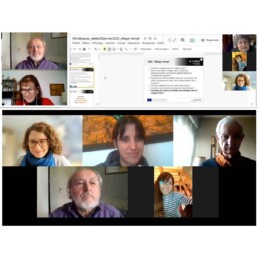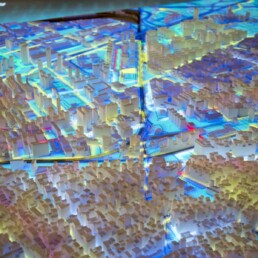Mindpsaces Workshop Tecla Scala with the mentalSpaces App
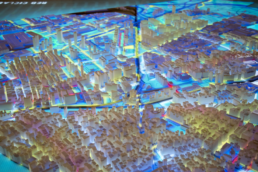
Mindpsaces Workshop Tecla Scala with the mentalSpaces App
What does the city’s form actually mean to the people who live there? What can the city planner do to make the city’s image more vivid and memorable to the city dweller? (Kevin Lynch)
Within the MindSpaces framework, artists in collaboration with the MindSpaces consortium aim at creating solutions that highlight the cultural significance of cities and sustainability issues they are facing, as well as paradigm-shifting designs of outdoors and indoors environments. More specifically the MindSpaces pilot use case one is concerning the modern city neighborhood of L’Hospitalet in Barcelona, Spain and aims through a novel working scheme between artists, technology experts and end users to propose innovative designs that address societal challenges identified in the city with the active collaboration of the citizens.
After the data collection of various sources (social media, opinions on blogs and public platforms, questionnaires to citizens, etc.) citizens can now be engaged in the design process through several MindSpaces tools and artworks (a mobile application, a maqueta and an artistic multisensory VR experience (João Martino Moura). Through these, citizens will have the opportunity to connect and leave their “voice” and preferences in a hybrid replica of the city. Finally the results will be showcased in a Professional Round Table that will take place in Tecla Sala in May (date to be confirmed).
The scope of MindSpaces is to create an approach responsive to societal needs and challenges that incorporate new technologies in architecture and urban design. Within this framework, we are adopting parts of Kevin Lynch’s theory, from his now classic book “The image of the city”. Lynch extensively discusses the concept of imageability that is a core notion of this use case. Imageability is the quality of a place that makes it recognizable and memorable. A place can have high imageability when specific physical elements and their arrangement evoke distinct mental images or positive feelings. Through the concept of imageability we can understand people’s preferences, “hear” local community’s opinions, increase social inclusion and create a sense of belonging.
In the first round of this exercise citizens of L’Hospitalet and visitors of Tecla Sala will have the opportunity to use the ‘mentalSpaces’ app (21 March and 15 April 2022) for providing images and comments for places and sites that they will choose, while exploring the city. More specifically the aim of this experience is to identify citizens’ perception of the city utilizing the categories as defined by Kevin Lynch’s (https://es.wikipedia.org/wiki/Kevin_Lynch) five elements: node, path, edge, district, and landmark. To achieve this the ‘mentalSpaces’ app will provide to citizens a set of predefined points that participants will be requested to navigate from and towards to. Users will be free to choose the followed path to reach their destination and take pictures along the way of distinguishable urban elements that were memorable or contributed to choosing their path. Finally, they will be requested to give one tag, or more, to the photographed elements from the Lynch categories. All of the data provided by the citizens will be visualized on a physical 3D model (maqueta) which is placed in Tecla Sala.
#startse #startseu #mindspaceseu #horizon2020 #innovativedesign #VertigoStarts #science #artandtechnology #eseniors #workshop #mentalSpaces #teclasala
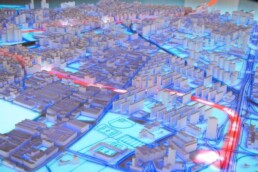
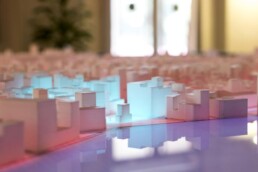

Mindpsaces Workshop “Virtual Village”
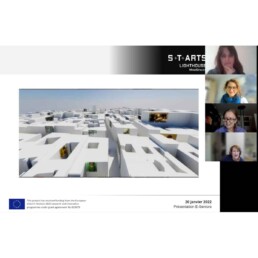
Mindpsaces Workshop “Virtual Village”
Mindpsaces Workshop “Virtual Village”
Online
20 January 2022
On the 20th of January 2022 in the framework of the project Mindspaces, E-Seniors organised two workshops with the senior citizens in Paris, France. The main objective of the event was to observe and identify the connectivity issues of the seniors in order to create a virtual platform. “Virtual Village” is a concept of the online space where the senior citizens will gather around the different topics of their interest and create a network of like-minded citizens. The main idea is to create a “virtual village” using the contents shared by the seniors. The content can be photo-video materials, piece of art, music, literature, etc. something that reflects their memories and favourite moments.
Findings suggest that the senior citizens are a heterogeneous group in terms of their connectivity. Some of them are active users of the social networks, while others do not use social media at all. However, all the participant seniors are willing to try the new virtual platform. The seniors shared their ideas about the virtual platform, namely, they would like to interact with people and share ideas on the topics such as health, administrative issues, recommendations on the museums and cultural establishments, etc. The workshop showed that the seniors need to build a connection on their interests and invite the people to share collaborative intelligence.
The next steps include gathering more content from the seniors and build up an online platform that enables seniors to connect and communicate via an innovative online channel, reinforcing their network. E-Seniors will test the platform with its first users once the “virtual village” is ready.
STARTS #startse #startseu #mindspaceseu #horizon2020 #innovativedesign #VertigoStarts #science #artandtechnology #eseniors #workshop
